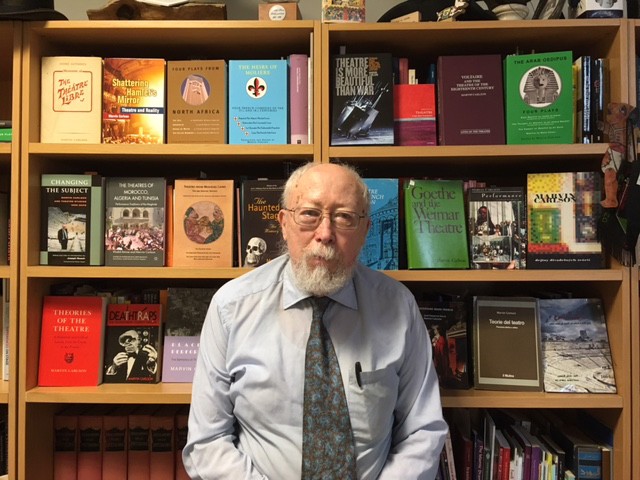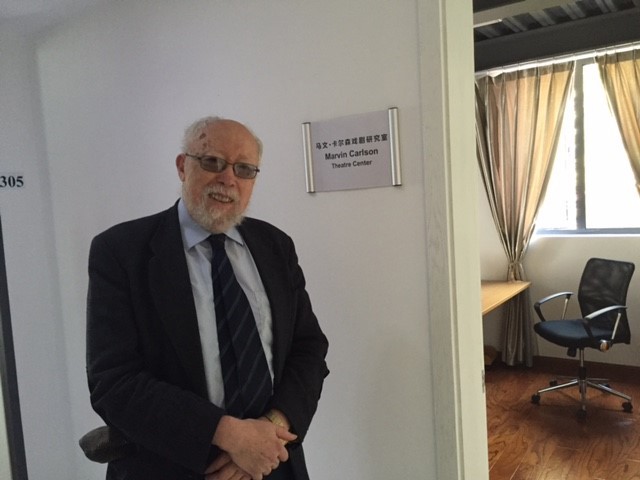Alum Marvin Carlson honored for lifetime achievements
By Kathy Hovis
Marvin Carlson’s reason for coming to Cornell for his doctoral degree reads a little like the storyline from “The Wizard of Oz.”
“I wanted to get out of Kansas,” said Carlson, who earned his bachelor’s and master’s degrees from the University of Kansas. He traveled east to earn his Ph.D. in theater from Cornell in 1961 and stayed on to teach in Cornell’s theater arts department for 18 years.
Carlson is a respected expert on theater history, theatrical theory, contemporary performance, experimental work, and Arabic and Islamic theater. He is a prolific author, with more than 320 journal articles and 20 books, including three published this year. And he has a virtual trophy case of awards and accolades. The most recent is the Thoth award from the Egyptian government in recognition of his work on Arabic drama, and the naming of the Carlson Center for Drama at the American University of Beirut and the Marvin Carlson Theatre Center at the Shanghai Theatre Academy.
As technical director in Cornell’s theater arts department, he designed and built sets and scenery. It was a job he wasn’t really qualified for, he said, but it allowed him to join the faculty until a position opened to teach theater history.
“I didn’t know one end of a hammer from the other,” Carlson said of his first position at Cornell. “But everybody was full of energy and I had four graduate assistants to help me, though they didn’t know what they were doing either.”
After two years, he moved into a position teaching theater history and world drama, directing shows and managing the department’s summer program.
“I enjoyed directing the most,” said Carlson, the Sidney E. Cohn Distinguished Professor of Theatre, Comparative Literature and Middle Eastern Studies at the Graduate Center of the City University of New York (CUNY). “In those days, directors had pretty clear openings to direct anything they wanted.”
Since Carlson focused much of his research on playwright Henrik Ibsen, he directed a number of plays by him at Cornell, but also directed “Oedipus,” “Hamlet,” works by Chekhov and many other productions.
Carlson went to the University of Indiana in 1979, where he expanded his interests into theory, which was just developing as a field, and wrote what would become his best-selling book, “Theories of the Theatre,” published in 1984 by Cornell University Press.
“I had never taken or taught a theory class, but the first theater class I taught at Indiana was one in semiotics [the study of signs and symbols used by playwrights or actors and the ways they are received by the public],” he said. The field was so new, Carlson said, “there was one book, two collections of essays in English and about 15 articles.”
After moving to CUNY in 1986, he combined his interests in history and theory to explore experimental and international theater.
“If there’s one thing that ties together everything I do, it is reception,” he said. “Who is the audience? Why do they go? What kind of experience do they have?”
Today, he campaigns to expand access to international theater. “I’ve always thought the theater should be more international than it is,” he said, adding that New York City falls behind many other cities hosting major productions by international playwrights.
“If you had somebody who said, ‘I don’t care whether I have an audience for the next two to three years, I’m going to put on things that are good so that I can develop an audience,’ that would be great,” Carlson said of New York City producers. “But nobody in the city can afford to do that.”
Carlson is celebrating publication of his latest book, “10,000 Nights: Highlights from 50 Years of Theatre-Going,” which breaks from his history and theory work to chronicle his years attending the theater in New York, Paris, Berlin, Moscow, Milan and other cities. In the book, he recalls one memorable production each year from 1960 to 2010.
“When I was at Cornell, I would go to the city every weekend and catch two to three plays,” he said. “In an average year, I see about 225 plays.”
When he moved to New York City, he started a file for every play that he’s seen, noting the date, title, author and director.
“I write about the productions not as a review, but about what it was like to go to the theater at that time,” he said.
Sara Warner, associate professor in the Department of Performing and Media Arts, is curating a roundtable discussion on “10,000 Nights” at an American Society for Theatre Research conference, co-sponsored by Cornell, in Atlanta in November. “This is an epic achievement by one of the world’s leading scholars,” noted Warner, “and I am absolutely delighted to be hosting this conversation.”
In 2009, Warner helped establish the Marvin Carlson Award for Best Essay in Theatre or Performance, an annual competition open to all Cornell undergraduate and graduate students.
Carlson and his wife own a home in Ithaca, and he’s kept up his involvement with the Department of Performing and Media Arts.
In May 2018, Carlson will be a principal speaker at a Cornell symposium on World Drama in Translation organized by Rebekah Maggor, assistant professor in the Department of Performing and Media Arts.
Kathy Hovis is a writer for the College of Arts and Sciences.
Media Contact
Get Cornell news delivered right to your inbox.
Subscribe

